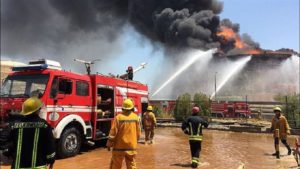by WorldTribune Staff, August 28, 2016
Iran said that a cyberattack on two of its petrochemical plants is not related to recent fires at the facilities.
A military official said on Aug. 27 that malware was discovered and removed from two of its petrochemical complexes, Reuters reported.

“In periodical inspection of petrochemical units, a type of industrial malware was detected and the necessary defensive measures were taken,” Gholamreza Jalali, head of Iran’s civilian defense, was quoted as saying by the state news agency IRNA.
When asked if the fire at Iran’s Bu Ali Sina refinery complex last month and other fires this month were caused by the newly-discovered malware, Jalali insisted “the discovery of this industrial virus is not related to recent fires.”
Major cyberattacks have been launched against Iranian targets since 2010, when the Stuxnet computer virus destroyed Iranian centrifuges that were enriching uranium. Stuxnet was said to have been jointly developed by the United States and Israel.
In 2012, Teheran’s computer systems were targeted by Flame, a virus described by the Kaspersky Internet security firm as the “most sophisticated cyber-weapon yet unleashed.”
Iran later admitted that its oil industry was briefly affected by Flame, but claimed its experts had detected and defeated the virus.
